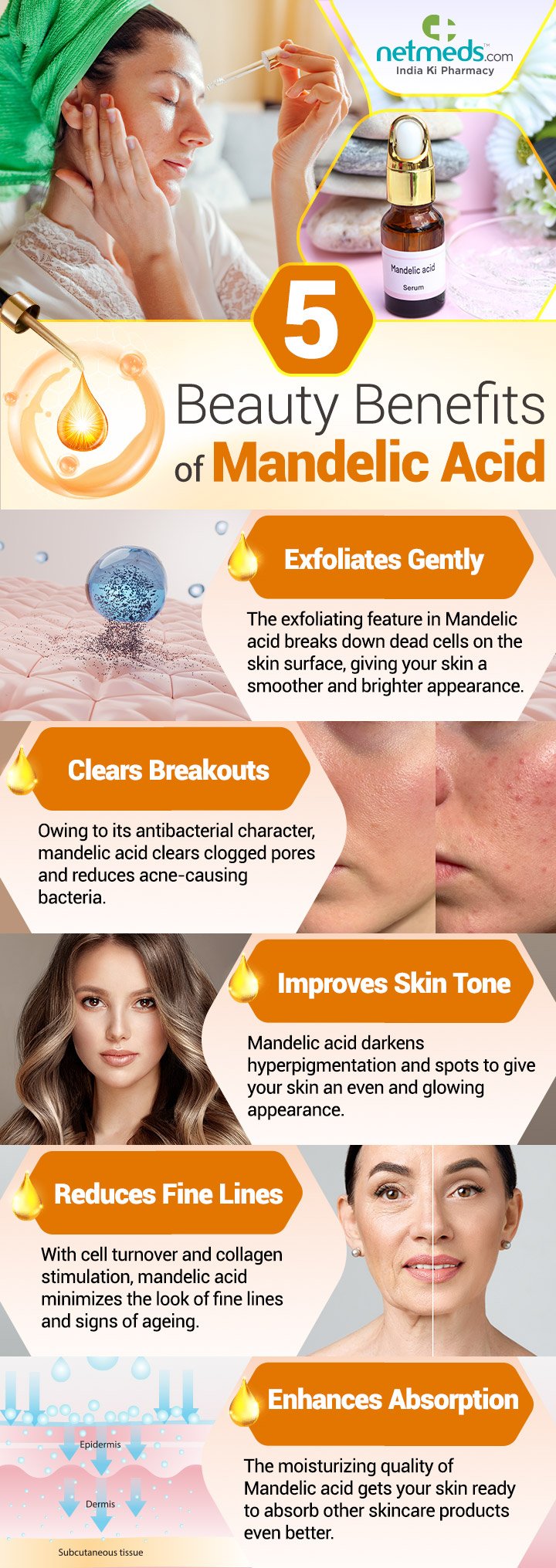You can get lost in skincare, especially when you have dozens of acids, serums, and magic ingredients that all claim to transform your skin overnight. If you have ever found yourself stuck between wanting to see results but not wanting any irritation, mandelic acid could be what your regimen has been missing.
Also Read: Benzoic Acid For Skin Care: Benefits, Uses, Side Effects And How To Use It Safely?
Made from bitter almonds, this mild peel is gaining popularity for its ability to smooth, brighten, and clarify the skin, without the unpleasant side effects that sometimes follow stronger acids. It acts gently but effectively and is a good choice for anyone with sensitive, acne, or even ageing skin.
Also Read: Lactic Acid For Skin Care: Health Benefits, Uses, Side Effects And More!
Therefore, regardless of whether you are a skincare expert or just a novice, mandelic acid is an easy but effective way to get that glowing, healthy-looking face.
To Battle All Your Skin Issues, Shop From Our Comprehensive Range Of Skincare Essentials Today!
What is Mandelic Acid?
Mandelic acid is an alpha-hydroxy acid derived from bitter almonds. It is a bigger molecule than other AHAs like glycolic or lactic acid and therefore penetrates the skin slowly, thus being less irritating and also suitable for sensitive or acne-prone skin. It is generally applied in chemical peels, serums, and toners to remove dead skin cells and improve the texture of the skin with regular use.
How Does Mandelic Acid Improve Skin Health?
Mandelic acid improves skin health by gently exfoliating the top skin layer, which strips away dead skin and removes clogged pores without irritating. As an alpha hydroxy acid (AHA) of a larger molecular size than glycolic or lactic acid, it is absorbed slowly into the skin, and therefore ideal for sensitive skin types. It helps in accelerating cell turnover, which bleaches dark spots, reduces acne breakouts, smoothes bumpy texture, and provides an overall radiance to the skin. Its antibacterial and anti-inflammatory components also make it effective to apply in curing mild to moderate acne, but promote a clearer, better-balanced complexion in the long term.
Tips to Include Mandelic Acid in Your Skincare Routine
Begin slowly: Begin by using it 2–3 times a week, especially if you are just starting out with exfoliating acids.
Apply in the evening: Since it makes the skin more sensitive to the sun, use it as part of your evening routine.
Use in combination well: Don't layer it over strong actives like retinol or other AHAs/BHAs initially.
Always moisturise: Then top it up with a hydrating serum or moisturiser to soothe and cushion the skin barrier.
Don't skip SPF: Sunscreen is a must the next day to prevent sun damage and additional pigmentation.
If you are looking for an exfoliating acid with results without the redness and irritation, mandelic acid is your answer. Its gentle-but-efficient quality makes it ideal for all skin types, especially if you are experiencing dullness, acne, or uneven skin tone.
Now, without further ado, here are 5 amazing uses of Mandelic acid to get spotless, radiant skin.

Like with all the good stuff in skincare, it is about being patient, but with continuous usage, mandelic acid will have you waking up to the smoother, clearer, brighter skin that you will love.
Frequently Asked Questions
Can I use mandelic acid every day?
If your skin can tolerate it, yes, but start slowly (2–3 times a week), then increase frequency gradually.
Is mandelic acid good for sensitive skin?
Yes! Its larger molecule renders it one of the more bearable AHAs, ideal for sensitive or reactive skin.
Can I use mandelic acid with retinol?
You can, but not simultaneously. Alternate nights are better to avoid irritation.
Does mandelic acid address acne scars?
Yes, it depigments post-acne scars and smoothens skin texture in the long term.
Which skin types is mandelic acid most suitable for?
Oily, acne, and sensitive skin types are best suited, but it is suitable for all skin types when used correctly.
(This article is reviewed by Kalyani Krishna Chief Content Editor)
Author Profile
Soumita Basu:
Soumita Basu holds a Bachelor’s Degree in Pharmacy and is keenly interested in Ayurveda, home remedies, yoga, fitness, diagnostics, and beauty. With nearly 6 years of experience, she produces evidence-based health content, including articles, videos, and infographics, to provide valuable insights to her audience.
References:



 Previous
Previous